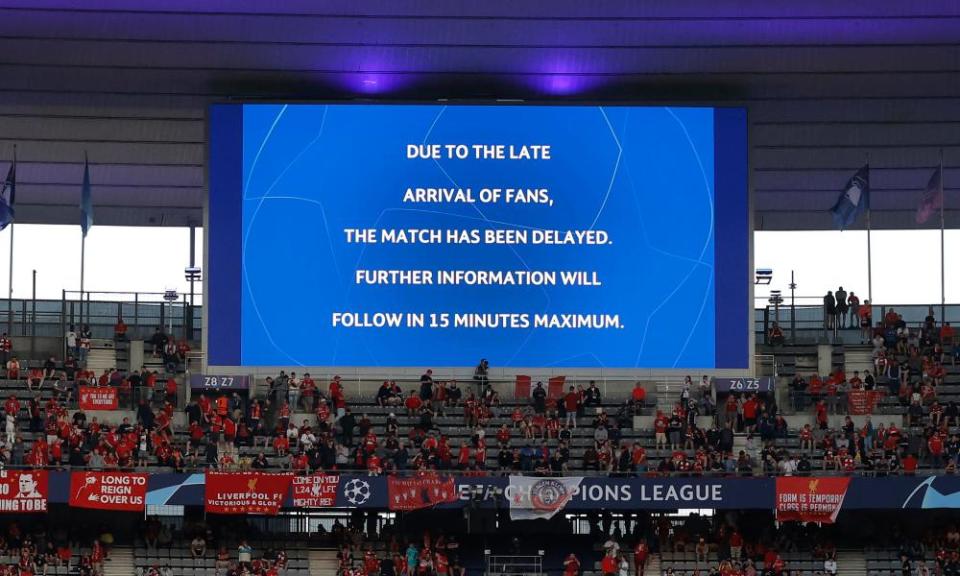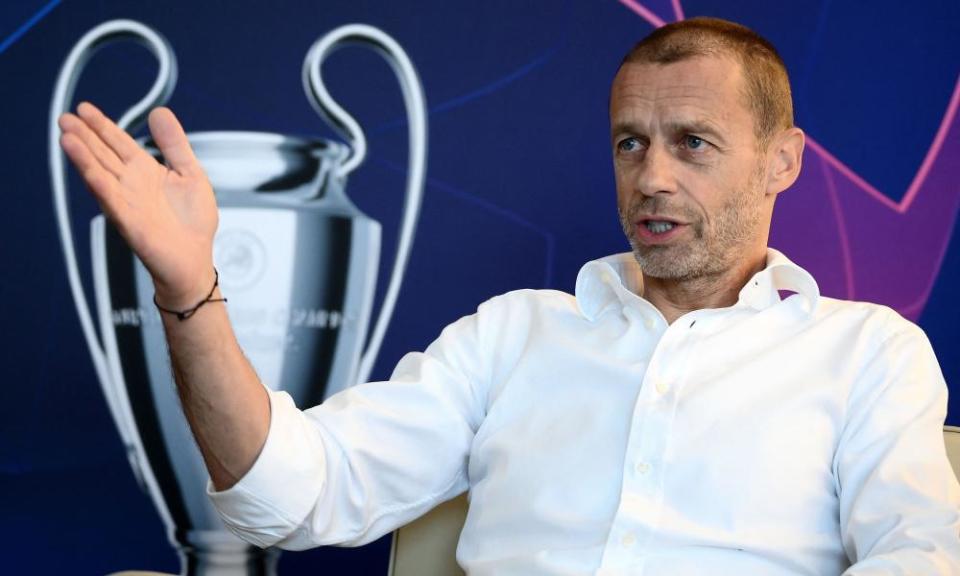Uefa pre-prepared Champions League final statement blaming ‘late’ fans

Uefa’s statement apparently blaming Liverpool supporters for causing the delay to the start of the Champions League final in Paris was pre-prepared a considerable time before the day of the match, the Guardian has learned. The statement, put up on the big screen at the Stade de France, announced that a delay to the scheduled 9pm kick-off of the final between Liverpool and Real Madrid had been caused by “late arrival of fans”.
The statement incensed Liverpool supporters, thousands of whom were still stuck in chaotic queues outside the stadium despite having arrived three or more hours before 9pm. Approximately 15,000 Liverpool supporters had been held up in a dangerous, bottleneck queue at a perimeter ticket checkpoint, then denied access to the stadium at turnstiles closed by stewards and police.
Related: How the Champions League final descended into chaos – visual investigation
As shown on the Guardian’s visual investigation, Paris police had directed Liverpool supporters to a ticket checkpoint using an alternative route that had been a known hazard since 2016, which involved thousands of people being funnelled through a narrow subway under the A1 motorway. A risk of crushing developed in the queue there and at turnstiles that were closed for long periods. Many Liverpool supporters, who had paid up to £600 to Uefa for tickets, also suffered brutal riot policing, including pepper spray and teargas, and attacks by local French men.
The statement blaming late arrival of fans was decided on in the planning stages of the match, as the one likely to be used in the event of kick-off having to be delayed, the Guardian understands. At the end of the match Uefa made a second statement, blaming “thousands of fans” at the Liverpool end with “fake tickets” for the kick-off delay.
For many Liverpool supporters the dangers suffered at the match, and Uefa’s two statements blaming them, were traumatic echoes of the 1989 Hillsborough disaster. There, 97 supporters were unlawfully killed in a crush due to South Yorkshire police gross negligence, but the force made a false case to blame late, ticketless supporters for causing the disaster.
Ian Byrne, a Liverpool MP and supporter who was at the match, said: “I find it truly shocking and horrifying to hear that Uefa – the confederation of Europe’s national football associations including the English FA – had a pre-prepared statement blaming supporters, as a standard explanation for a kick-off delay. To do it to Liverpool supporters after everything we’ve been through is appalling. We need full answers as to how all these decisions were made.”
Steve Rotheram, the mayor of Liverpool city region, has called for Uefa’s own “independent review” of the near-disaster at the Stade de France to include a full investigation of the decision to initially delay the kick-off by only 15 minutes. He said that the Uefa president, Aleksander Ceferin, appeared to take the decision in the stadium’s VIP area, after conversations with Uefa officials and a contingent from each club.

Rotheram was also in the VIP area witnessing the crisis discussions, having been robbed of his mobile phone and wallet outside the subway, then been escorted to safety by a French police officer.
Rotheram confronted Ceferin about the dangers outside, but said the president replied dismissively that Uefa had “killed itself” to get the final staged, having switched it from St Petersburg in February. Rotheram says he replied with concern that fans outside could be killed and that Ceferin retorted: “This conversation is over.”
Related: ‘I feared for my life’: Liverpool fans on their Champions League final traumas
Rotheram then wrote to Ceferin on 6 June accusing him of being “defensive”, saying he was “disappointed” Ceferin had cut short the conversation. His letter also criticised the initial decision to delay kick-off by only 15 minutes: “The piecemeal delays to kick-off time only demonstrate the underestimation of the seriousness of the situation I and others (including representatives from Liverpool FC and the Football Association) had clearly conveyed,” the letter said.
Ceferin replied on 10 June saying: “It was never my intention to be disrespectful,” while acknowledging that “I may have appeared curt”. He explained that he was “certainly” aware of the seriousness of the crisis: “I felt I had to cut our discussion short because at that time we had bigger problems to solve: making sure there were no casualties, ensuring that fans with tickets could get into the stadium and, finally, getting the game started.”
Ceferin’s letter did not address Rotheram’s criticism of the kick-off delay, but referred to Uefa’s review, saying its remit is to understand fully what happened in Paris, and to make sure “it never happens again”.

Rotheram told the Guardian: “As Liverpool supporters know to our great cost, having suffered the Hillsborough disaster where the kick-off was not delayed, the decision is a vital one for people’s safety, as it can relieve a dangerous crisis. Ultimately the kick-off in Paris had to be delayed by 36 minutes. So the questions need to be answered as to how and why 15 minutes was initially chosen.”
Of the second statement blaming Liverpool supporters with fake tickets, Rotheram said he believed Uefa had wanted to shift the blame on to fans.
“It was right out of the playbook; they weren’t going to take responsibility. I got that feeling in the VIP area, that they didn’t want to be held responsible as an organisation.”
Uefa’s review, announced two days after the final, is due to produce a report by the end of November. On 3 June the organisation issued a “sincere apology” to spectators “who had to experience or witness frightening and distressing events in the build-up to the Uefa Champions League final … which should have been a celebration of European club football.” However Uefa has not admitted to any failings itself, or retracted the statements blaming Liverpool supporters.
Download the Guardian app from the iOS App Store on iPhones or the Google Play store on Android phones by searching for 'The Guardian'.
If you already have the Guardian app, make sure you’re on the most recent version.
In the Guardian app, tap the yellow button at the bottom right, then go to Settings (the gear icon), then Notifications.
Turn on sport notifications.
The Guardian sent Uefa a detailed series of questions, about the statements, and the decision to delay the kick-off by 15 minutes, but it declined to answer. A spokesperson repeated the apology, and said: “Uefa will no longer reply to your queries until the end of the independent investigation around the events in the buildup to the Uefa Champions League final at the Stade de France on 28 May 2022 in Paris.”
The review panel is expected to meet fans’ representatives, including Liverpool’s supporters’ trust Spirit of Shankly, on Saturday.

 Yahoo Sport
Yahoo Sport 





































